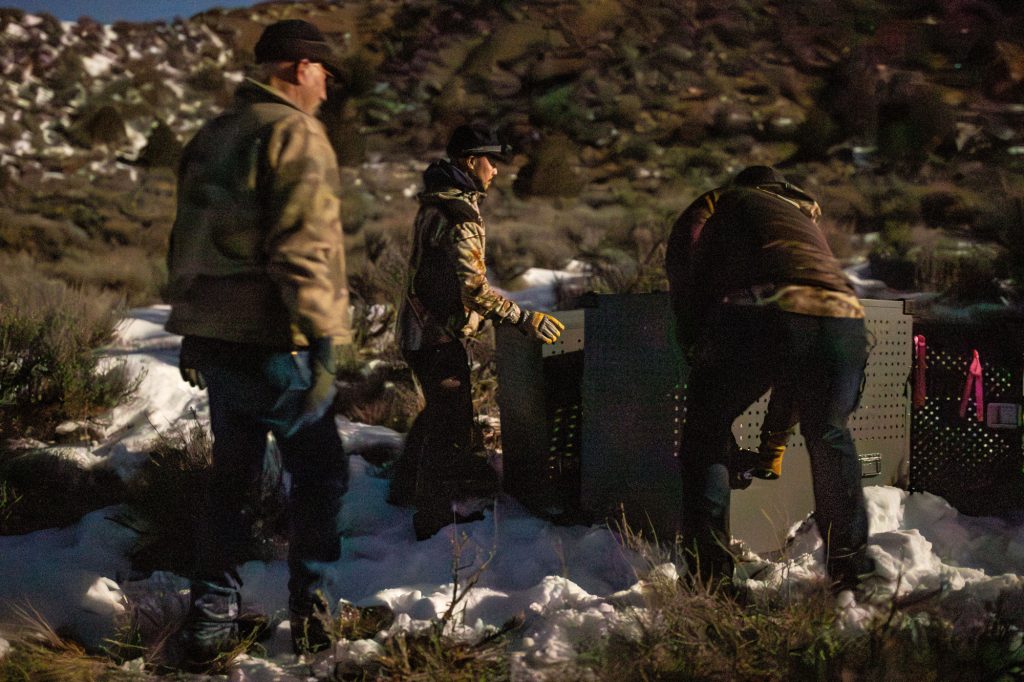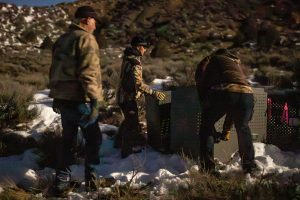Initiative seeking to stop Colorado wolf releases fails to collect enough signatures to make the 2026 ballot measure
However, the group behind the initiative, Colorado Advocates for Smart Wolf Policy, is not giving up

Colorado Parks and Wildlife/Courtesy Photo
A citizen-led initiative to halt wolf reintroductions in Colorado by December 2026 failed to collect enough signatures by its August deadline to make it on the ballot.
However, organizers say they’re not done just yet.
Initiative 13, run by a group called Colorado Advocates for Smart Wolf Policy, had until Aug. 27 to collect around 125,000 valid signatures in order to get its measure on the November 2026 ballot.
On Friday, Patrick Davis, Smart Wolf Policy’s lead organizer, said the group had collected just over 25,000 signatures and was still counting.
Davis said the initiative had over 400 volunteers across the state circulating petitions for the measure. Ultimately, he credited the failure to collect enough signatures to a lack of funds.
“We weren’t able to raise the million dollars that it would have taken to hire a paid petitioning company to get those 100,000 signatures,” Davis said.
According to the secretary of state’s campaign finance database, Colorado Advocates for Smart Wolf Policy had raised $38,897 as of July 15 and spent just over $30,000.
The ballot measure proposed ending the state’s reintroduction of gray wolves by Dec. 31, 2026, and prohibiting the importation of wolves into Colorado. It also would have removed the classification of gray wolves as “non-game” wildlife and listed livestock guard and herding animals in statute within the states’ depredation compensation programs.
Colorado’s wolf reintroduction program was initiated by a ballot measure in November 2020. The measure — which narrowly passed by 56,986 votes — mandated Colorado Parks and Wildlife to create a self-sustaining population of gray wolves, requiring the first release to occur by Dec. 31, 2023.
In the wildlife agency’s wolf management plan, which was approved in May 2023, it was recommended that Colorado release between 30 and 50 wolves in three to five years to achieve the measure’s goal. Parks and Wildlife has released 25 wolves in the first two years of the restoration effort, and is planning to do at least one more release of wolves this winter.
From a biological perspective, the program has been lauded as a success by conservationists, with the reintroduced wolves establishing four packs. However, it has also seen consistent controversy and pushback, primarily from Western Slope producers and communities where the wolves are living, who argue that the state and ranchers were not prepared to deal with the new predator.
The controversy has led to several calls for Parks and Wildlife to halt or pause wolf reintroductions, including through a petition submitted to the agency’s commission last fall, which was denied, and attempts by state lawmakers.
Most recently, during a special session this August, a bipartisan group of Western Slope legislators passed a bill that redirected funds set aside for the acquisition and release of wolves this winter. While the initial version of the bill would have prohibited Parks and Wildlife from releasing any wolves this year, this provision was removed following pushback from the governor, environmental groups and Front Range lawmakers.
Davis said that the failure of these attempts to pause the wolf program is what led the group to consider another ballot measure.
“We believe the only way to durably and permanently halt the reintroduction program is for a vote of the people to codify it in law,” Davis said. “To get this permanently halted and stop importing wolves that they can’t manage already, we’ve got to put this in front of the voters again and have the voters declare what they want to have done because the legislature and the governor and the
(Colorado Parks and Wildlife) board hasn’t been able to get it done.”
Smart Wolf Policy’s initiative met some opposition in March, when a coalition of northwest Colorado commissioners and agriculture groups wrote a letter asking the group to reconsider putting wolves back on the ballot. The coalition’s primary concern was that the initiative failed to get input from the stakeholders most affected by Colorado’s reintroduction efforts and ran contrary to the outcomes landowners and producers were angling for.
Davis believes that this opposition “hurt our fundraising dramatically.”
However, Davis said Colorado Advocates for Smart Wolf Policy has opened discussions with the groups and entities in the coalition to consider another ballot initiative.
“We’re in talks with them now to determine what our next step is,” he said.
While the failure to collect enough signatures by the deadline means that Initiative 13 is dead in this iteration, Davis said they are not giving up and are in discussions with partners about what another proposal would look like.
“The easiest thing would be for us to just take the language that was already approved by the title board in Initiative No. 13 and just run it through the title board again,” Davis said. “It should sail through, and we should get a petition that we can start circulating again.”
To get a citizen-initiated measure on the November 2026 ballot, the last day groups can submit a proposal for the title board is April 3, 2026. This is the first step toward getting a measure on Colorado’s ballot.
However, Davis said Smart Wolf Policy could be looking to submit this fall.
“Look for some activity from us in the middle of September,” he said.

Support Local Journalism

Support Local Journalism
As a Summit Daily News reader, you make our work possible.
Summit Daily is embarking on a multiyear project to digitize its archives going back to 1989 and make them available to the public in partnership with the Colorado Historic Newspapers Collection. The full project is expected to cost about $165,000. All donations made in 2023 will go directly toward this project.
Every contribution, no matter the size, will make a difference.










